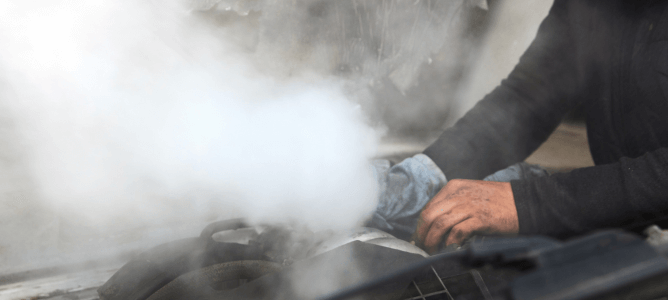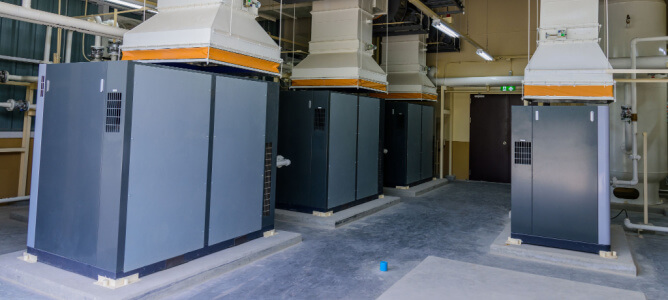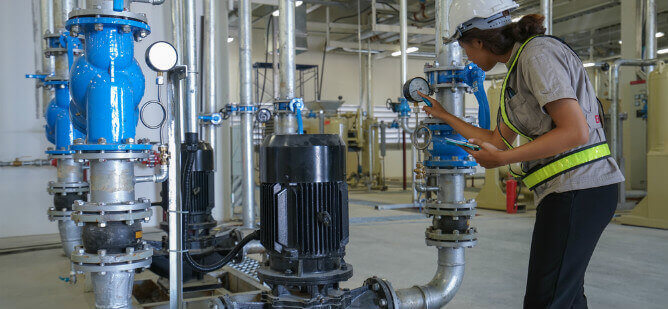
Overheating Air Compressors: Causes and Solutions
Air compressors are essential to many industries, powering everything from pneumatic tools to providing air for industrial processes. However, one common problem that arises with air compressors is overheating. Overheating can lead to reduced efficiency, costly air compressor repairs, and even catastrophic failure. In this article, we will explore how air compressors work, what causes them to overheat, the consequences of overheating, and the signs you can look out for to prevent it.
How Air Compressors Work
Industrial air compressors use compressed air to power various tools and equipment. They take in ambient air and compress it using a compressor before storing it in a tank for later use. Proper ventilation is essential for preventing overheating and ensuring efficient operation. Routine maintenance, including checking oil levels and lubrication, keeps air compressors running smoothly. Monitoring performance issues like high discharge temperatures helps identify potential problems. By understanding how air compressors work, you can optimize their performance and prevent overheating.
Common Causes of Overheating Air Compressors
Insufficient ventilation or clogged vents can restrict airflow, leading to overheating. Low oil levels or poor-quality oil can increase friction and generate excess heat within the compressor. High ambient temperatures, especially during summer, can also contribute to overheating. Mechanical issues like worn-out parts or malfunctioning thermal valves can cause excessive heat buildup. Furthermore, a lack of routine maintenance, such as failing to clean air filters and condenser coils, can reduce cooling efficiency.
Consequences of Overheating
Overheating can have severe consequences for air compressors. It can cause damage to internal components and significantly reduce the compressor’s lifespan. Excessive heat leads to decreased performance, reducing air output and air compressor efficiency. Furthermore, overheating can cause oil breakdown, leading to increased friction and accelerated wear on compressor parts. This affects the overall functionality and increases energy consumption and operating costs.
Signs your Air Compressor is Overheating
It is important to always be on the lookout to know when your air compressor starts acting unusual. That way, you can prevent unnecessary shutdowns or any production loss. Watch for these signs that tell you when your compressor is overheating.
Abnormal noise levels
Unusual grinding or rattling sounds during compressor operation may indicate overheating. It is essential to pay attention to sudden changes in noise levels as they could be a sign of a mechanical issue. Regular monitoring of noise levels can help identify potential overheating problems before they escalate. If abnormal noise persists, shut down the compressor and inspect for mechanical issues.
Rising discharge temperatures
Low refrigerant levels or poor lubrication can cause high discharge temperatures. Regularly checking these temperatures helps prevent damage to internal compressor components. If the discharge temperatures consistently rise above normal operating ranges, it is essential to investigate the cause and take immediate action to address issues causing elevated discharge temperatures.
Frequent shutdowns due to temperature limits
Frequent shutdowns of air compressors can occur when the temperature limits are reached. These temperature limit settings are built-in safety features designed to protect against overheating. When a compressor repeatedly shuts down due to temperature limits, it is a clear indication of overheating. Automatic shutdown features help prevent further damage and allow the compressor to cool down. It is important to investigate potential causes, such as inadequate ventilation or mechanical problems, to address this issue.
Unusual vibrations
Unusual vibrations during compressor operation may indicate overheating or mechanical issues. These vibrations could indicate misalignment, worn-out parts, or imbalance within the compressor. Addressing and resolving the cause of these vibrations can prevent further damage to the compressor. Including daily monitoring of vibrations as part of routine maintenance ensures optimal performance.
Preventive Measures
To prevent overheating in air compressors, conducting routine maintenance is crucial. Regularly check oil levels and lubricate the compressor to ensure optimal performance. Another preventive measure is cleaning air filters to maintain airflow and prevent overheating. Additionally, inspecting and cleaning condenser coils contribute to efficient cooling. Monitoring discharge temperatures regularly will detect any signs of overheating. Lastly, adequate ventilation and airflow around the compressor are essential to prevent heat buildup.
Regular maintenance and inspection schedules
Inspecting the compressor regularly will help identify any signs of wear or damage. Additionally, clean and replace air filters regularly to ensure proper airflow. Checking for leaks in the system is also vital to prevent overheating. Lastly, always follow the manufacturer’s guidelines for routine air compressor testing, maintenance, and service.
Ensuring proper ventilation and cooling
To ensure proper ventilation and cooling for your air compressor, it is essential to provide adequate airflow. Clear any debris or obstructions around the vents for smooth air circulation. Additionally, consider using fans or additional cooling equipment in hot environments to prevent overheating. Installing a cooler or heat exchanger can also help reduce operating temperatures. Finally, place the compressor in a well-ventilated area to promote proper air system functioning.
Monitoring and controlling operating temperatures
Maintaining the ambient temperature within the recommended range and utilizing thermal valves or temperature sensors to track and control compressed air temperature levels is important. Adjusting the compressor’s settings to ensure optimal operating temperatures can help prevent overheating. Additionally, implementing automatic shutdown features can provide an extra layer of protection against overheating.
Proper lubrication and fluid levels
To prevent overheating in air compressors, it is crucial to ensure proper lubrication and maintain appropriate fluid levels. Regularly check and maintain the oil levels in the compressor as per the manufacturer’s recommendations. Always use the recommended lubricant that suits the specific requirements of your air compressor. Monitor the oil quality and viscosity regularly to avoid any issues. Proper lubrication of internal parts is essential to prevent friction and overheating. Additionally, make sure to drain the condensate regularly to avoid moisture buildup.
Adjusting pressure settings according to requirements
By setting appropriate pressure limits, you can prevent overworking the compressor and minimize the risk of overheating. During periods of high ambient temperature, consider using lower pressure settings to alleviate strain on the system. To ensure the proper adjustment of pressure settings, consult the manufacturer’s guidelines for recommended values. This will help you achieve optimal results while extending the lifespan of your air compressor.
Troubleshooting Overheating Issues
To troubleshoot overheating issues with air compressors, it is important to identify the most common reasons for this problem. Start by checking for clogged or dirty air filters that can restrict airflow and cause the compressor to overheat. Inspect the discharge line and cooler coils for any blockages or damage. Ensure that the air compressor receives the proper voltage supply to prevent high voltage surges that can lead to overheating. Additionally, monitoring refrigerant levels and addressing any low refrigerant or leaks contributing to overheating is crucial.
Tips for Choosing the Right Air Compressor
When choosing the right air compressor, consider your specific requirements and usage. Determine your applications’ necessary horsepower and CFM (cubic feet per minute). Evaluate the available space and consider the size and portability of the compressor. Assess the power source options, such as electric, gas, or diesel, based on your needs. Additionally, research and compare different air compressor brands and models to find the one that suits your needs best.

Explore NiGen Industrial Air Compressors
Discover the extensive range of industrial air compressors provided by NiGen. These compressors boast advanced features and cutting-edge technology, ensuring optimal performance. NiGen compressors excel in various applications and industries, delivering reliable and efficient results.
Contact us now or browse our selection of air compressor rentals in Houston.

